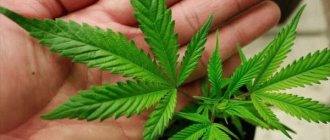ST 231 of the Criminal Code of the Russian Federation.
1. Illegal cultivation on a large scale of plants containing narcotic drugs or psychotropic substances or their precursors is punishable by a fine in the amount of up to three hundred thousand rubles or in the amount of the wages or other income of the convicted person for a period of up to two years, or by compulsory labor for a term of up to four hundred thousand. eighty hours, or restriction of liberty for a term of up to two years, or imprisonment for the same term.
2. The same acts committed: a) by a group of persons by prior conspiracy or by an organized group; b) has become invalid; c) on an especially large scale - is punishable by imprisonment for a term of up to eight years, with or without restriction of freedom for a term of up to two years.
Note : Large and especially large cultivation of plants containing narcotic drugs or psychotropic substances or their precursors, for the purposes of this article, are approved by the Government of the Russian Federation.
Commentary to Art. 231 Criminal Code
1. The subject of the crime is plants containing narcotic drugs or psychotropic substances or their precursors. The list of plants, their significant, large and especially large sizes are indicated in Decree of the Government of the Russian Federation of November 27, 2010 N 934.
2. Cultivation of narcotic plants - activities related to the creation of special conditions for sowing and growing narcotic plants, as well as their sowing and cultivation, improving cultivation technology, breeding new varieties, increasing productivity and resistance to adverse meteorological conditions (Article 1 of the Federal Law dated January 8, 1998 N 3-FZ “On narcotic drugs and psychotropic substances”).
3. The objective side of the crime can be expressed in the commission of one of the actions that make up the concept of “cultivation”. On the nature of these actions, see paragraph 29 of the Resolution of the Plenum of the Supreme Court of the Russian Federation of June 15, 2006 No. 14. Actions must be performed illegally, i.e. in violation of the order established by the legislation of the Russian Federation.
The current legislation of the Russian Federation provides for punishment not only for the acquisition, storage, transportation, shipment, and sale of narcotic drugs, but also for the illegal cultivation (cultivation) of drug-containing plants.
In accordance with Article 1 of the Federal Law of January 8, 1998 No. 3-FZ “On Narcotic Drugs and Psychotropic Substances,” the illegal cultivation of narcotic plants is an activity related to the creation of special conditions for sowing and growing narcotic plants, as well as their sowing and growing, improving cultivation technology, breeding new varieties, increasing productivity and resistance to adverse weather conditions, carried out in violation of the legislation of the Russian Federation.
The legislation of the Russian Federation provides for administrative and criminal liability for the illegal cultivation of drug-containing plants.
Article 10.5 of the Code of the Russian Federation on Administrative Offenses (hereinafter referred to as the Code of Administrative Offenses of the Russian Federation) provides for liability for failure by a farmer or land user to take measures to destroy wild plants containing narcotic drugs or psychotropic substances or their precursors. Such actions are punishable by the imposition of an administrative fine on citizens - in the amount of one thousand five hundred to two thousand rubles; for officials - from 3 thousand to 4 thousand rubles; for legal entities - from 30 thousand to 40 thousand rubles.
Article 10.5.1 of the Code of the Russian Federation on Administrative Offenses provides for liability for the illegal cultivation of narcotic plants. Such actions are punishable by the imposition of an administrative fine on citizens in the amount of one thousand five hundred to four thousand rubles or administrative arrest for up to 15 days; for legal entities - from 100 thousand to 300 thousand rubles.
Identification and suppression of administrative offenses related to illicit trafficking and non-medical use of narcotic drugs is of great importance in preventing crime in this area (crimes of double prevention). The application of enforcement measures to persons who have committed administrative offenses is aimed, first of all, at preventing crimes, which often turns out to be effective. Thus, on the one hand, the principle of the inevitability of punishment even for committing an offense is implemented, on the other hand, a preventive effect is exerted on the person at the early stage of the formation of criminal intent, which has a psychological preventive effect.
If illegal actions contain signs of a crime, then liability arises under Article 231 of the Criminal Code of the Russian Federation. At the same time, at present, criminal liability arises only if illegal cultivation is carried out on a large or especially large scale.
In accordance with Article 18 of the Federal Law of 01/08/1998 No. 3-FZ “On Narcotic Drugs and Psychotropic Substances”, the cultivation of narcotic plants is prohibited on the territory of the Russian Federation, except for the cultivation of such plants for use in scientific, educational purposes and in expert activities and varieties of narcotic plants permitted for cultivation for industrial purposes. This means that even hilling, loosening, removing weeds and watering the soil around drug-containing plants forms signs of cultivation.
Decree of the Government of the Russian Federation dated November 27, 2010 No. 934 approved a list of plants containing narcotic drugs or psychotropic substances or their precursors and subject to control in the Russian Federation, as well as large and especially large sizes of cultivation of these plants for the purposes of Article 231 of the Criminal Code of the Russian Federation ( hereinafter referred to as the Criminal Code of the Russian Federation). For example, plants containing narcotic drugs include: hemp, poppy, blue lotus, mushrooms of any kind containing psilocybin and (or) psilocin, coca bush, sage and others.
These acts are punishable by a fine in the amount of up to 300 thousand rubles or in the amount of the wages or other income of the convicted person for a period of up to two years, or by compulsory labor for a period of up to 480 hours, or by restriction of liberty for a term of up to 2 years, or by imprisonment for that same deadline.
The same acts committed by a group of persons by prior conspiracy or by an organized group, or on an especially large scale, are punishable by imprisonment for up to 8 years.
The legislation of the Russian Federation not only prohibits the cultivation of narcotic plants, but also obliges land owners to destroy narcotic plants growing or illegally cultivated on used plots and owned plots.
Deputy Prosecutor of the Tabunsky District D.A. Veselov
Second commentary to Art. 231 of the Criminal Code of the Russian Federation
1. The subject of the crime in question is, firstly, plants prohibited for cultivation in Russia (opium poppy, coca bush, khat), and secondly, certain varieties of hemp, poppy and other plants, the cultivation of which is prohibited for the purpose of illegal consumption or use in illicit trafficking of narcotic drugs (for example, oilseed and other varieties of poppy, Indian, South Chuyskaya, South Arkhonskaya, Krasnodar, Central Russian and other varieties of hemp).
2. The list of plants prohibited for cultivation is established by the Decree of the Government of the Russian Federation of November 27. 2010 No. 934".
3. The cultivation of narcotic plants “should be understood as activities related to the creation of special conditions for sowing and growing narcotic plants, as well as their sowing and cultivation, improving cultivation technology, breeding new varieties, increasing productivity and resistance to adverse meteorological conditions” (clause 29 of the resolution of June 15, 2006).
4. Sowing of plants prohibited for cultivation means sowing seeds or planting seedlings without proper permission on any land plots, including empty lands. In this case, the crime is considered completed from the moment of sowing, regardless of the subsequent germination or growth of plants.
5. Growing plants prohibited for cultivation means caring for crops and seedlings in order to bring them to a certain stage of maturation (watering, fertilizing, weeding, etc.). The crime in this form is considered completed from the moment the first actions to grow the relevant crops are committed.
6. The subsequent production of narcotic drugs from grown plants containing narcotic substances is not covered by Art. 231 of the Criminal Code and requires additional qualifications under Art. 228 of the Criminal Code as illegal acquisition of narcotic drugs. The same applies to other actions provided for in Art. 228 and 228.1 of the Criminal Code.
7. Illegal cultivation of plants containing narcotic drugs or psychotropic substances or their precursors is a crime only on a large scale.
8. The subjective side of the crime is characterized by direct intent.
9. Responsibility upon reaching the age of 16 years.
10. A crime is recognized as committed by a group of persons by prior conspiracy or by an organized group under the circumstances described in Part 1. 2 or 3 tbsp. 35 of the Criminal Code. The actions of participants in an organized group are qualified under paragraph “a” of Part 2 of Art. 231 of the Criminal Code, regardless of their role. The second qualifying feature (item “c”) is especially large size.
11. Large and extra large size in accordance with the note to Art. 231 of the Criminal Code should be established on the basis of the rules approved by the Decree of the Government of the Russian Federation of November 27. 2010 No. 934.
What does judicial practice show under this article?
When cultivating narcotic plants, the Criminal Code of the Russian Federation applies Article 231. It is often used, as many people seek to grow illicit plants to obtain drugs for the purpose of using or selling them.
- Citizen G. grew hemp on his plot of land outside the city. Afterwards, he dried it, crushed it and made cigarettes or sold the powder to drug addicts for smoking. He was tracked down and detained. Over 100 cannabis bushes were found on the site. This was recognized as large in size and became the reason for initiating a criminal case. Additionally, his actions were classified as drug sales. The court made a guilty verdict, G. was imprisoned for 6 years.
- Citizen M. was engaged in floriculture and grew various flowers. She came across a poppy in one of the packets of seeds. She didn’t know it was prohibited, so she imprisoned him. In the summer, the investigation carried out a check on the land plots of the population and saw poppy bushes on the citizen’s property. Since there were not many of them (3 pieces), this did not become the basis for initiating a criminal case. They interviewed the citizen, gave her a warning and ordered her to pull out the bushes. She did just that.
- Citizen V. was growing opium poppy in his garden. He had 4 acres of land, which he planted all with poppy seeds, after which he began cultivating it, drying it and making narcotic substances. Neighbors complained about him, the investigation checked his actions and found out that they were illegal. Since the bushes were grown on a large scale, V. was prosecuted. He was imprisoned for 7 years.
What is hemp cultivation?
Expert opinion
Pankov Roman
Cultivation of hemp refers to the creation of conditions under which the “grass” will not only grow well, but will also be resistant to adverse weather conditions.
Cultivation also refers to actions aimed at improving cultivation technology, developing new varieties, increasing the yield of hemp, etc.
According to Art. 18 of Federal Law No. 3-FZ of 01/08/1998 “On Narcotic Drugs” it is prohibited to cultivate hemp on the territory of Russia.
The only exception is the cultivation of this “weed” for its further use for educational, scientific purposes, as well as in industry (if it is not used for the manufacture of drugs).
Cultivation of hemp for further legal use for educational and scientific purposes can only be carried out by state enterprises that have the appropriate license.
Cultivation of hemp for industrial purposes can only be carried out by legal entities or individual entrepreneurs.
Responsibility for growing hemp in 2022
The Criminal Code of the Russian Federation has a separate article numbered 231, which clearly states the punishment for the illegal cultivation of drug-containing plants.
Thus, for breeding and growing cannabis on a large scale, the perpetrator or perpetrators may face the following punishment:
The punishment for growing cannabis will be harsher if:
- A group of people were engaged in illegal activities.
- The attacker was engaged in the cultivation of prohibited grass on an especially large scale.
It is important to know: What is an invoice according to the TORG-13 form: how to fill it out correctly, why it is needed, a sample and a form to fill out
In these cases, the perpetrators will face the following punishment:
- imprisonment for a term of up to 8 years with restriction of freedom (up to 2 years) or without such restriction.
Cannabis cultivation: when is there criminal and when is administrative liability?
For growing hemp (cannabis), from which marijuana is made, law-abiding citizens may be subject to administrative or criminal liability. It all depends on the amount of cultivated “grass”.
So, if a person grew hemp on a small scale, then he faces administrative liability in accordance with Art. 10.5.1. Code of Administrative Offenses of the Russian Federation: a fine of 1.5-4 thousand rubles or restriction of freedom for a period of 15 days.
Expert opinion
Pankov Roman
If before May 19, 2010, a person faced criminal liability for cultivating hemp even in small quantities, then since 2010 administrative liability has been provided (in accordance with amendments to Federal Law No. 87-FZ).
By small size we mean growing cannabis of no more than 20 bushes. If there are more than 20 bushes, then this is already criminal liability.
This is important to know: Refusal to testify: when it is allowed and when it is not





